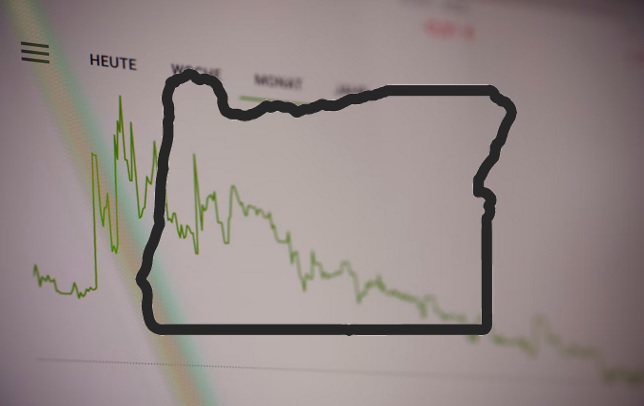By Oregon Business and Industry
With the Feb. 21 release of its annual Value of Jobs report, the Portland Business Alliance provided yet more evidence of the competitiveness crisis affecting Oregon, and particularly the state’s economic, political and cultural center in Portland. Contributing to this crisis are rapidly escalating state and local taxes, an increasingly daunting regulatory environment, insufficient developable land, rampant retail theft and many other factors that, taken together, have eroded Oregon’s business climate and tarnished its reputation.
In response, OBI has developed a Growth and Innovation Roadmap that contains dozens of recommendations to encourage private-sector investment in Oregon. Renewed prosperity will come only by growing the state’s economy, which will happen only if Oregon and the Portland area create the conditions that encourage the private sector to invest here rather than elsewhere. Doing more of what brought us to this point will further encourage capital flight and discourage growth and investment.
The resources below underscore the urgency that should motivate state lawmakers and Portland area leaders to act:
The Value of Jobs Coalition State of the Economy report: The report, produced by ECONorthwest, contains two components, an analysis of the Portland metropolitan area’s economy and a supplement focused on the state of Portland’s downtown. The former report indicates that employment rebounded in the Portland region following the end of the pandemic, but less so within Multnomah County, whose population dropped by nearly 12,700 in 2022. Clark County, Wash., has been the big winner, gaining $177 million in tax filer income thanks to migration from Multnomah County alone.
The Value of Jobs Coalition’s Portland supplement is equally worrisome. Employee foot traffic in the central city remains 48% below 2019 levels. Visitor foot traffic is 30% below pre-pandemic levels, and central city office vacancy rates are double the historic average.
“The economic outlook, especially for the City of Portland, is as concerning as any time since the twin recessions of the 1980s,” the report warns. “People and businesses vote with their feet, and they are not voting for Portland, the city or the region, in the way they have in the recent past. If this trend continues it could lead to a stagnant and underproductive economic future for our region and the state.”
Go here for an executive summary of the of the State of the Economy report, here for an executive summary of the State of Downtown & the Central City report and here for the full report.
Oregon State and Local Tax Burdens: Prepared by national accounting firm Ernst & Young and commissioned by the Oregon Business & Industry Research and Education Foundation, this report documents the stunning rise in state and local business taxes since 2019. These include a 45% increase in the state business tax burden and a 32% increase in local taxes in the Portland area. Taken together, state and local increases have given Portland the second highest combined individual income tax rate in the country. At 14.69%, Portland’s combined rate trails only New York’s 14.78%. Moreover, Portland residents need to earn only $125,000 per year to trigger the highest marginal rate. A New York taxpayer would have to make 200 times that amount – $25 million – to trigger the city’s highest rate.
This report, released in October 2022, explains why so many Portland-area residents are voting with their feet by leaving.
Go here to read the full report and here to view a slide deck of significant findings.
Oregon Semiconductor Competitiveness Task Force Report: This report, released in August 2022, reflects the work of a task force created to analyze the state of the semiconductor industry in Oregon and make recommendations for its continued growth. The task force identified immediate opportunities to grow the industry, thanks in part to federal investments available through the CHIPS Act. However, the task force also identified significant barriers that must be overcome to take advantage of these opportunities. Barriers include tax policy, land availability, Oregon’s regulatory environment and more.
Read the report here.
Oregon Small Business Survey: OBI surveyed more than 440 small businesses in late January and early February, and the results are alarming. Oregon’s local businesses feel overtaxed and overwhelmed by rapidly changing regulations. And to a stunning degree, they don’t think lawmakers care about their success. The email survey’s results include:
- 74% of respondents say that regulations affecting business change so frequently that it is hard to keep up with what they’re supposed to do.
- 71% of respondents say that state agencies seem more interested in finding wrongdoing (even when there isn’t any) than in helping businesses like theirs comply with regulations.
- Only 18% of respondents believe that state lawmakers care about the success of their businesses.
- Only 7% of respondents believe the state’s business climate will improve in the coming year.
Go here to read more about the survey and here to see a slide deck of survey responses.
“They Left: Portland Is Losing Some of Its Biggest Fans”: In this Feb. 1 story, Willamette Week takes a closer look at the people who have left Portland in recent years, where they’ve gone and why. Many of those interviewed objected to soaring local taxes, particularly given little evidence paying higher taxes had improved conditions in the city. Read the story here.
Disclaimer: Articles featured on Oregon Report are the creation, responsibility and opinion of the authoring individual or organization which is featured at the top of every article.


